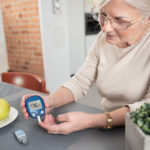January 20, 2012
By David Blyweiss, M.D.
In This Issue:
- How much does your doctor really know?
- The 10 health screens that can tailor your resolution to best suit your needs
- Where to go when you want health care, not sick care
Making It Personal
Over the last 5 issues of Advanced Natural Wellness, I’ve gone in-depth about how to keep a very simple, but revolutionary, New Year’s resolution: Eat right, gently move your body, and sleep 8 hours.
I’ve even put the articles together in a special report you can download and share with a resolution buddy. (If you haven’t done so yet, click here to get your own copy.)
Today, in this final article of the series, I want to address how you can make these general suggestions more personalized to you and your health needs. And to warn you in advance… it might take a little extra effort on your part. You probably already know why…
After most articles covering topics on food, nutrition or supplements, there is usually a sentence that says, “check with your doctor.” And in fact, we recommend the same thing. Because aligning general recommendations with your health needs is important.
But when you try to check with your doctor, you discover how little they know about food and nutrition… and maybe they don’t believe in using supplements at all. Or they don’t know enough about them, so they push you towards a pharmaceutical product.
MD Exposes the Hidden Danger to Your Eyes

When your eyesight starts to fail, it's a real problem. Suddenly you can't go to the grocery store... you can't get to the doctor if you have an emergency... you can't meet your friends for dinner…
Your "regular" doctor doesn't have time to keep up with the latest research. And the same goes for eye doctors. They go to school to learn how to fit you for glasses and contacts, but have no way of preventing the damage and loss of eyesight that threatens your freedom and independence.
Let me show you something that explains a LOT about how your eyes work.
In my FREE Special Report, I'll show you a HUGE, untapped resource for your eyes that safely and naturally restores clear, effortless eyesight.
Click here to get started...
Well, you can’t really blame your doctor. I’m going to let you in on a little secret about medical schools in this country…
In the mid-80’s the Committee on Nutrition in Medical Education conducted a survey to find out how much nutrition education existed in U.S. medical schools. In their landmark report, they found the majority of schools taught less than 20 hours on the topic, and 20% of the schools taught less than 10 hours. They recommended a minimum of 25 curriculum hours.
Just last year, in their follow-up report, they found the majority of medical schools in the U.S still fall far short of the recommended minimum.
Now, in defense of my colleagues, many of us take it upon ourselves to fill this critical gap in knowledge, and go on to study functional medicine, naturopathy, orthomolecular medicine, holistic health and other fields that have a deeper understanding how food and nutrition affect the health of our patients.
My final recommendation in this series is that you find out how much nutritional knowledge your physician has before you let them be the final arbiter of your health decisions, and determine for yourself whether it is enough to guide you in keeping your New Year’s Resolution.
At the end of this issue, I’ve also included some additional resources if you find you need to widen your team of health providers. Here’s an idea of how it should go…
If a patient came in to my office and said, “I’ve made a resolution to eat right, gently move my body, and sleep 8 hours,” here’s how I would work with them to tailor my recommendations to suit that patient’s specific health needs.
I would start by getting a complete history, for the patient and their genetic family. Do they have a history of high lipids, heart disease, cancer? Are they suffering from any chronic conditions, such as overactive inflammatory response, digestion problems, or diabetes?
Then, I would order a set of tests to determine some important markers and nutrient levels – and adjust the general food and supplement recommendations accordingly.
Here are the 11 tests I routinely run – and that you can ask for – to get a snapshot of where you stand, and can begin to personalize the general health recommendations you read:
Note: Don’t worry if this list sounds a little too technical or confusing… you’re not going to have to sit for your medical exams any time soon! But it’s a good starting place for a conversation with your doctor. And if you share this list with him or her, and they are as confused as you are, be sure to use the referral number at the end of this issue.
1) Complete Blood Count (CBC): This is the standard starting place that every physician uses to measure of the concentration of white blood cells, red blood cells, and platelets in the blood.
The World's Quickest Solution for Ending Prostate and Urinary Misery
This has recently been revealed to be one of the only real breakthroughs in prostate health.
The seeds of a strange fruit (sometimes called "Chinese Apples") hold powerful phytonutrients that are a revolution in prostate health.
In fact, UCLA and Veterans Administration research have now proved this to be true.
Not only that, but it may be the worlds quickest solution for ending prostate misery.
Simply stated, these phytonutrients represent a huge step beyond beta sitosterol, saw palmetto, and other phytosterols alone.
Simply click HERE if you want to have fast prostate relief...restful, uninterrupted sleep...no more constant "urges to go"...enhanced virility...and optimal prostate support for life.
2) Full Thyroid Panel: Make sure any thyroid testing includes T3 and T4 and a TPO (not just a TSH) – also known as a full thyroid panel. Many doctors are calling for thyroid screens starting at age 35. It’s a great idea, but until it becomes the norm, you might have to ask.
3) Reverse T3 (rT3): This test is most-often used for the person who is on thyroid medication and is not feeling better. It tests a thyroid hormone that isn’t included in a full thyroid panel – and solves an important mystery for many people with thyroid conditions, whether known or unknown.
4) Vitamin D: This vitamin is so critical to your immune system, and so chronically low in older adults, that screening is a must at the beginning of any health regimen.
5) VAP/Lipid Test: This is especially important if you have a family history of high lipids.
6) Homocysteine level may be a separate indicator of heart attack or stroke, and it is also important to see how methylation is happening in the body. This is one of the most helpful indicators when choosing the supplements and dosages your body requires for optimal health.
7) Serum or Urine Methylmalonic Acid: This test reveals a vitamin B12 deficiency, weeks or even months before it would show up in blood tests for anemia, or worse, in symptoms.
8) Serum GGT: This is a liver enzyme test that can show toxicity. It will show how well the body is regenerating and recycling glutathione, a master antioxidant. It can also be a future diabetes predictor.
9) Serum Heavy Metals and Organic Pollutants: While these tests don’t show the body’s complete burden of stored toxins, it reveals enough to know what you might need to remove and detox from your body, and what might be causing allergy, chronic current health problems or identify the seeds for future issues that can be addressed before they arise.
10) Highly Sensitive C-Reactive Protein (hsCRP): This test reveals chronic systemic inflammation, which is a hallmark of chronic degenerative disease. Nutrition and supplementation is often the key to addressing these conditions, and this test can let you know where to start.
11) DHEA-S: DHEA is one of the main adrenal hormones. Studies show low levels of DHEA over long periods of time can actually shorten your lifespan. Being proactive in supplementing this hormone could make a huge difference in your health and longevity.
This may sound like a lot of tests, but they can all be run through a regular blood or urine sample, just like what you leave with the doctor at an annual check-up.
Gathering information before you get sick is a key factor is choosing wellness and health. When you know how your particular system is functioning, what you need to support, and how… and you have both medical and motivational support to make those changes… you become a walking health revolution.
Most of the medical system in this country is geared towards acute care. And by all means, if I break a bone, or am in a car accident, or have an emergent medical problem, I’m heading to the closest emergency room… and you should, too.
But more people than at any time in our history are suffering from complex, chronic diseases that are a result of many factors: environment, lifestyle, and genetic predisposition.
That’s why some physicians, like myself, believe in treating the person, not just the symptoms – and focusing on prevention, rather than waiting until a person is sick, can’t move, and has limited their life expectancy, to take action.
One place to find such physicians is in the database of the Institute for Functional Medicine at www.functionalmedicine.org. Or you might call a naturopathic physician, chiropractor, integrative medicine specialist, or holistic health practitioner. Many of the professionals who use these titles will be familiar with the types of recommendations, tests and the personalized health approach I advocate here in Advanced Natural Wellness.
More than anything, in 2012, I wish you a healthy year. And all the support you need to successfully take on this simple – but radical – resolution.
Eat right, gently move your body, and sleep 8 hours.
How is it possible for that to change everything? You’ll see.
Resources:
Adams, Kelly M. MPH, RD et. al. Nutrition Education in U.S. Medical Schools: Latest Update of a National Survey, Academic Medicine: September 2010 – Volume 85 – Issue 9 – pp 1537-1542 doi: 10.1097/ACM.0b013e3181eab71b
Nutrition Education in U.S. Medical School, Original Report: http://www.nap.edu/openbook.php?record_id=597&page=R1






